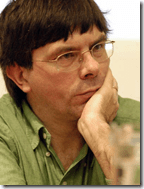 I follow Richard Dawkins (pictured in blue shirt) in the news simply because he interests me and in his new book, The Greatest Show on Earth, he has written about the carbon dating of the Shroud of Turin including this:
I follow Richard Dawkins (pictured in blue shirt) in the news simply because he interests me and in his new book, The Greatest Show on Earth, he has written about the carbon dating of the Shroud of Turin including this:
The dating of the shroud remains controversial, but not for reasons that cast doubt on the carbon-dating technique itself. For example, the carbon in the shroud might have been contaminated by a fire, which is known to have occurred in 1532. I won’t pursue the matter further, because the shroud is of historical, not evolutionary, interest.
 So I noticed a long and interesting interview with Dawkins in the New York Times two days ago:
So I noticed a long and interesting interview with Dawkins in the New York Times two days ago:
Professor Dawkins’s closest intellectual ally on progressive evolution and convergence is Simon Conway Morris (pictured in green shirt), the renowned Cambridge evolutionary paleontologist.
And Professor Morris, as it happens, is an Anglican and a fervent believer in a personal God. He sees convergence as hinting at a teleology, or intelligent architecture, in the universe. (emphasis mine)
Ask Professor Dawkins about his intellectual bedfellow, and his smile thins. “Yes, well, Simon and I have converged on the science,” he says. “I should think in the world there are not two evolutionary scientists who could rival each other in their enthusiasm for convergence.”
As to Professor Morris’s religious faith? “I just don’t get it.”
It helps to know who Morris is. According to the NNDB he is, indeed, an Anglican/Episcopalian and . . .
. . . a professor of evolutionary paleobiology at the University of Cambridge, best known in scientific circles for his research and writing about the Burgess Shale formation, a fossil field in mountains of British Columbia. He has taken a somewhat middle of the road position on creation, accepting evolution as scientific fact but arguing that convergent evolution (similar biological traits in unrelated lineages, or as Morris puts it, "Many different groups of plants have learned how to become trees") suggests the existence of a creator working through evolution. He has written that the presence of human beings, despite long odds against mankind’s existence, is a miracle, and humans "had to exist, exactly as we are." He also maintains that life on other planets is extremely unlikely, but that if such life forms exist the most evolved and advanced beings among them would be similar to humans on Earth.
It is an interesting article. I recommend it.
For unbiased minds, the scientists’ findings are perfectly in accordance with the following statement from ‘My Conversations With Jesus Christ’ by Alan Valiant
(www.sphere8.com): ‘It is the actual shroud that covered my body as I lay unconscious in the tomb.I am aware that modern scientists are very puzzled by the imprint upon the shroud and this is not surprising because it was put there by a spiritual means by the Lord God Himself.He was determined to recover as much as possible from my ruined mission so He impressed the features of my body onto the shroud.Scientists have recently claimed that the results of their carbon-dating techniques show that the shroud is much younger than the time of my crucifixion.They are confused because, when the Lord God “treated” the shroud, He also “rejuvenated” it in order to extend its life beyond that of the cloth alone.The Lord God is capable of altering physical matter at an atomic level and , by this means, was able to make the cloth more durable.No man could have faked the Turin shroud and the cause of the imprint will continue to baffle scientists.These people will one day realize that there are things in existence about which they know nothing’. A free ebook containing spiritual truth from the highest source can be downloaded here: https://www.smashwords.com/books/view/77641